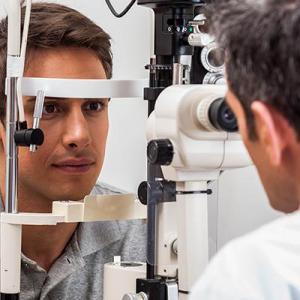Managing Diabetes Complications: Kidney Disease
Kidneys filter your blood through millions of blood vessels and then dispose of body waste in your urine. Diabetes can damage these small blood vessels, making it hard for the kidneys to filter your waste. As a result, diabetes is the leading cause of kidney failure. About 30% of people with type 1 diabetes and 10%–40% of those with type 2 diabetes will eventually have kidney disease, or nephropathy.1 Smoking, uncontrolled blood glucose, or high blood pressure, may increase your risk of kidney disease. Having a family member with kidney disease also increases the risk of developing kidney disease....
Read MoreManaging Diabetes Complications: Foot Problems
Proper foot care is an important part of a person with diabetes’ daily routine. High blood glucose levels can damage the blood vessels that carry oxygen and nutrients to the legs and feet. This can lead to nerve damage, poor circulation, infections and foot deformities. Diabetes is often associated with foot problems and amputation. Not including those caused by accidents or trauma, more than 60% of lower-limb amputations performed each year are on people with diabetes. 1 What to Look For The Canadian Diabetes Association recommends that your feet be examined at least once a year—more often if...
Read MoreManaging Diabetes Complications: Eye Disease
People with diabetes are at higher risk for several types of eye disease, including retinopathy, cataracts and glaucoma. Any of these diseases can lead to blindness over time. Early detection is the key to avoiding or lessening the risk of these diseases. Retinopathy, the most common eye disease in people with diabetes, is caused by damage to the blood vessels of the retina that helps us to see. In some cases, these vessels may swell and leak fluid. This is called nonproliferative, or backgroundretinopathy. As these areas heal, scarring occurs and abnormal new blood vessels may grow on the retina's...
Read MoreManaging Diabetes Complications: Kidney Disease
Kidneys filter your blood through millions of blood vessels and then dispose of body waste in your urine. Diabetes can damage these small blood vessels, making it hard for the kidneys to filter your waste. As a result, diabetes is the leading cause of kidney failure. About 30% of people with type 1 diabetes and 10%–40% of those with type 2 diabetes will eventually have kidney disease, or nephropathy.1 Smoking, uncontrolled blood glucose, or high blood pressure, may increase your risk of kidney disease. Having a family member with kidney disease also increases the risk of developing kidney disease....
Read MoreManaging Diabetes Complications: Nerve and Pain Damage
High blood glucose may damage the insulation of nerve cells and nerves may stop sending signals through the body the way they should. This is called neuropathy. Many people know that nerve damage can affect their hands and feet—that is why your healthcare professional should check the sensation in your feet at every visit. But nerve damage can affect every organ in the body—from your digestive tract to your bladder and sexual organs. Nerve damage can also affect your ability to feel the symptoms of low blood glucose.1 Who Is at Risk for Diabetic Neuropathy? About 60%–70% of people with diabetes...
Read MoreManaging Diabetes Complications: High Blood Pressure
High blood pressure, or hypertension, occurs when the force of blood flow inside blood vessels is too high. The heart has to work harder to pump blood through the body, which can contribute to serious health problems. People with diabetes and high blood pressure have nearly twice the risk of heart disease as people who have only high blood pressure. Studies also show an increased risk of kidney damage, diabetic eye disease and stroke when hypertension is a factor.1 Causes of High Blood Pressure According to the Public Health Agency of Canada, about 40% of people with diabetes also have high blood...
Read MoreManaging Diabetes Complications: Skin Problem and Skin Care
Ways to keep skin healthy Healthy skin isn't just about how you look, and people with diabetes shouldn’t take it for granted. When there's too much glucose in your bloodstream, your body will try to flush it away, losing moisture in the process. As a result, people with diabetes tend to have dry skin. Much of a diabetes skin care regimen, then, revolves around replenishing that moisture. High blood glucose levels can affect your skin in several ways: loss of fluids (dehydration) due to more frequent urination can make your skin dry skin may become extra dry, itchy or cracked ...
Read MoreManaging Diabetes Complications: Dental and Gum Care
People with diabetes are more than twice as likely to have gum disease as people without diabetes. Both gum disease and gum infection are common complications of diabetes. In fact, nearly one-third of people with diabetes have severe periodontal disease.1 Regular dental checkups and good dental care at home can reduce dental problems. Types of Problems In addition to tooth decay and gum disease, you may experience these other problems that occur more often in people with diabetes: Thrush (oral candidiasis) is a fungal infection in the mouth that causes white or red spots on the...
Read MoreManaging Diabetes Complications: Foot Problems
Proper foot care is an important part of a person with diabetes’ daily routine. High blood glucose levels can damage the blood vessels that carry oxygen and nutrients to the legs and feet. This can lead to nerve damage, poor circulation, infections and foot deformities. Diabetes is often associated with foot problems and amputation. Not including those caused by accidents or trauma, more than 60% of lower-limb amputations performed each year are on people with diabetes. 1 What to Look For The Canadian Diabetes Association recommends that your feet be examined at least once a year—more often if...
Read MoreManaging Diabetes Complications: Eye Disease
People with diabetes are at higher risk for several types of eye disease, including retinopathy, cataracts and glaucoma. Any of these diseases can lead to blindness over time. Early detection is the key to avoiding or lessening the risk of these diseases. Retinopathy, the most common eye disease in people with diabetes, is caused by damage to the blood vessels of the retina that helps us to see. In some cases, these vessels may swell and leak fluid. This is called nonproliferative, or backgroundretinopathy. As these areas heal, scarring occurs and abnormal new blood vessels may grow on the retina's...
Read MoreManaging Diabetes Complications: Kidney Disease
Kidneys filter your blood through millions of blood vessels and then dispose of body waste in your urine. Diabetes can damage these small blood vessels, making it hard for the kidneys to filter your waste. As a result, diabetes is the leading cause of kidney failure. About 30% of people with type 1 diabetes and 10%–40% of those with type 2 diabetes will eventually have kidney disease, or nephropathy.1 Smoking, uncontrolled blood glucose, or high blood pressure, may increase your risk of kidney disease. Having a family member with kidney disease also increases the risk of developing kidney disease....
Read MoreManaging Diabetes Complications: Nerve and Pain Damage
High blood glucose may damage the insulation of nerve cells and nerves may stop sending signals through the body the way they should. This is called neuropathy. Many people know that nerve damage can affect their hands and feet—that is why your healthcare professional should check the sensation in your feet at every visit. But nerve damage can affect every organ in the body—from your digestive tract to your bladder and sexual organs. Nerve damage can also affect your ability to feel the symptoms of low blood glucose.1 Who Is at Risk for Diabetic Neuropathy? About 60%–70% of people with diabetes...
Read MoreManaging Diabetes Complications: High Blood Pressure
High blood pressure, or hypertension, occurs when the force of blood flow inside blood vessels is too high. The heart has to work harder to pump blood through the body, which can contribute to serious health problems. People with diabetes and high blood pressure have nearly twice the risk of heart disease as people who have only high blood pressure. Studies also show an increased risk of kidney damage, diabetic eye disease and stroke when hypertension is a factor.1 Causes of High Blood Pressure According to the Public Health Agency of Canada, about 40% of people with diabetes also have high blood...
Read MoreManaging Diabetes Complications: Skin Problem and Skin Care
Ways to keep skin healthy Healthy skin isn't just about how you look, and people with diabetes shouldn’t take it for granted. When there's too much glucose in your bloodstream, your body will try to flush it away, losing moisture in the process. As a result, people with diabetes tend to have dry skin. Much of a diabetes skin care regimen, then, revolves around replenishing that moisture. High blood glucose levels can affect your skin in several ways: loss of fluids (dehydration) due to more frequent urination can make your skin dry skin may become extra dry, itchy or cracked ...
Read MoreManaging Diabetes Complications: Dental and Gum Care
People with diabetes are more than twice as likely to have gum disease as people without diabetes. Both gum disease and gum infection are common complications of diabetes. In fact, nearly one-third of people with diabetes have severe periodontal disease.1 Regular dental checkups and good dental care at home can reduce dental problems. Types of Problems In addition to tooth decay and gum disease, you may experience these other problems that occur more often in people with diabetes: Thrush (oral candidiasis) is a fungal infection in the mouth that causes white or red spots on the...
Read More






